A valuation of USD 1,323.2 Million is projected for the Sustainable Bamboo Charcoal Market in 2025, with revenues expected to climb to USD 3,850.7 Million by 2035. This represents a gain of more than USD 2,527 Million over the decade, reflecting a growth of nearly three times from the base year.
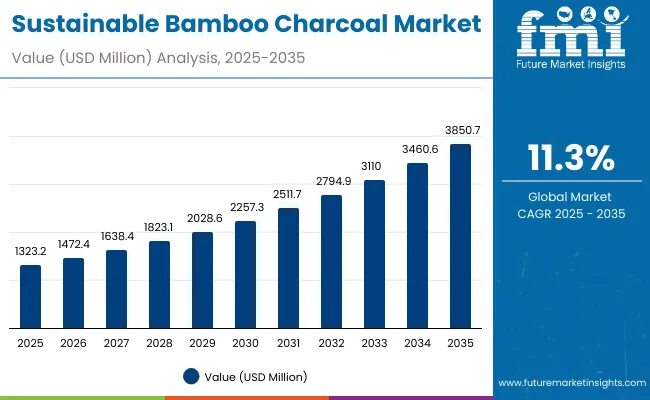
Sustainable Bamboo Charcoal Market Key Takeaways
| Metric | Value |
|---|---|
| Sustainable Bamboo Charcoal Market Estimated Value in (2025E) | USD 1,323.2 million |
| Sustainable Bamboo Charcoal Market Forecast Value In (2035f) | USD 3,850.7 million |
| Forecast CAGR (2025 to 2035) | 11.30% |
The expansion translates into a CAGR of 11.3% across the forecast period, signifying strong momentum in demand for sustainable and natural detoxification solutions. From 2025 to 2030, the market is anticipated to rise steadily from USD 1,323.2 Million to USD 2,257.3 Million, thereby contributing almost 37% of the total decade’s expansion. This phase is likely to be characterized by deeper consumer preference for eco-friendly claims, which held a dominant 53.5% share in 2025, supported by sustainable sourcing and clean-label positioning. Detoxifying functions, which commanded a 52.5% share in the same year, are expected to remain the leading attribute, driven by growing urban lifestyles and heightened concerns over pollution and skin health.
The second half of the forecast period from 2030 to 2035 is projected to generate a sharper upswing, with the market advancing from USD 2,257.3 Million to USD 3,850.7 Million. This leap accounts for nearly 63% of the overall decade growth, reflecting intensified adoption across e-commerce and pharmacy channels as consumers increasingly value authenticity and transparency. Formats associated with everyday detox routines are expected to strengthen their position, while eco-claims and sustainable packaging are likely to secure premium placements. With strong growth led by Asia, particularly India and China, the sector is forecast to maintain its trajectory as a core category in sustainable personal care.
From 2025 to 2035, the Sustainable Bamboo Charcoal Market is projected to expand by more than USD 2,527 Million, tripling its size within a decade. Early growth is expected to be driven by rising consumer inclination toward eco-friendly and detoxifying functions, which together accounted for more than half of the market in 2025. During this period, demand is anticipated to strengthen across North America and Europe, while Asia-Pacific will emerge as the central growth engine due to India’s and China’s rapid adoption. Competitive intensity is expected to remain high, with leading global beauty and personal care brands leveraging sustainability credentials, clean-label positioning, and eco-packaging to secure consumer trust.
Over the decade, eco-claims and detoxifying properties are projected to anchor market expansion, while oMillionichannel distribution is likely to accelerate adoption. Traditional players are expected to face rising pressure from niche entrants emphasizing sustainability-first strategies. Competitive advantage is forecast to shift from conventional product portfolios toward integrated approaches combining environmental responsibility, ingredient transparency, and consumer-centric innovation.
Growth in the Sustainable Bamboo Charcoal Market is being driven by the rising demand for natural and eco-friendly personal care solutions. Consumer awareness regarding the harmful effects of synthetic ingredients has increased, and preference has shifted toward detoxifying and sustainable alternatives. Strong adoption is being observed in urban markets, where rising pollution levels have elevated the need for products offering oil control and detoxification. Expansion of e-commerce platforms and specialty beauty channels has created wider access, while pharmacies are strengthening credibility through clean-label offerings. Eco-friendly claims, which held a dominant share in 2025, are expected to attract long-term loyalty as regulatory frameworks around sustainability continue to tighten. Packaging innovations, including plastic-free and recyclable solutions, are being promoted as premium differentiators. Additionally, growth in Asia, led by India and China, is projected to accelerate due to rising disposable incomes and increasing focus on wellness. Together, these factors are expected to sustain double-digit expansion.
The Sustainable Bamboo Charcoal Market has been segmented across three major dimensions: claim, function, and product type. Each of these segments highlights different drivers shaping adoption and value creation. Claim-based segmentation emphasizes eco-friendly positioning versus other attributes, reflecting the growing importance of sustainability in consumer decision-making. Functional segmentation focuses on detoxifying benefits compared with other skin health solutions, showcasing the demand for preventive and pollution-related care. Product type segmentation examines the relative performance of masks versus other formats, indicating shifts in daily usage and broader category integration. Together, these segments provide a detailed understanding of how consumer priorities, regulatory trends, and innovation pipelines are expected to define the market’s evolution through 2035.
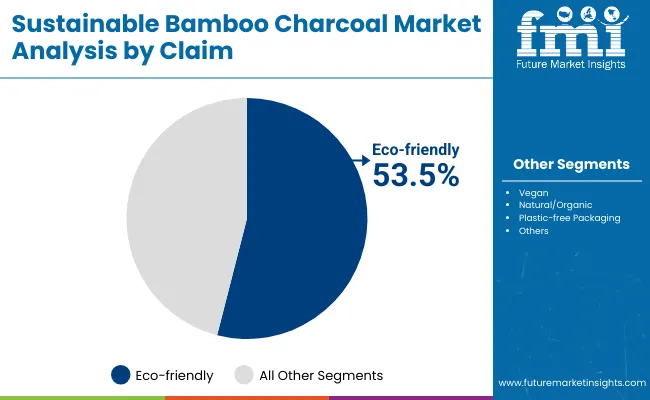
| Segment | Market Value Share, 2025 |
|---|---|
| Eco-friendly | 53.5% |
| Others | 46.5% |
The eco-friendly segment is projected to remain dominant with a 53.5% value share in 2025, representing USD 695.6 Million. Rising consumer preference for clean-label and sustainable products has been driving this leadership. Global regulations promoting environmentally responsible solutions are expected to further accelerate demand. Transparent sourcing and recyclable packaging are being prioritized, which is likely to strengthen eco-friendly claims as a differentiator. Growing awareness of plastic-free alternatives is anticipated to push premium adoption, while “others” remain significant but less differentiated. Over the forecast period, eco-credentials are expected to act as a core growth lever, securing stronger retailer and e-commerce placements and reinforcing brand equity.
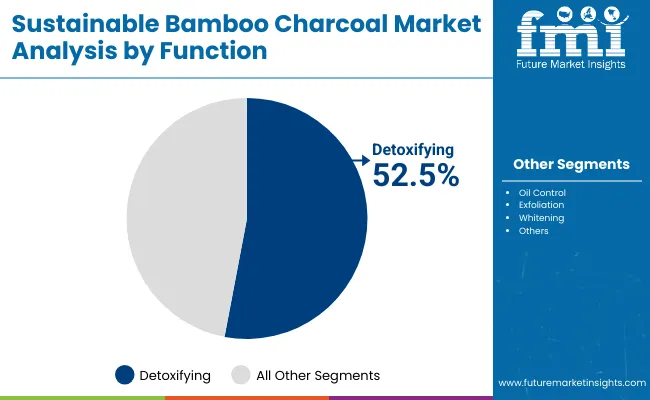
| Segment | Market Value Share, 2025 |
|---|---|
| Detoxifying | 52.5% |
| Others | 47.5% |
The detoxifying function held a 52.5% share in 2025, valued at USD 682.8 Million, and is anticipated to remain the primary growth driver. Increasing urban pollution levels and rising consumer concerns about oil control and skin purification have been fueling this trend. Market demand is expected to strengthen further as detoxifying claims align with preventive skincare routines and wellness positioning. Product launches combining detoxification with exfoliation and hydration are projected to reinforce consumer loyalty. Although “others” accounted for 47.5% of value in 2025, their growth is expected to be slower as multi-functional formulations are prioritized. The detoxifying segment is likely to retain its dominance by offering clear efficacy supported by clinical validation and visible results.
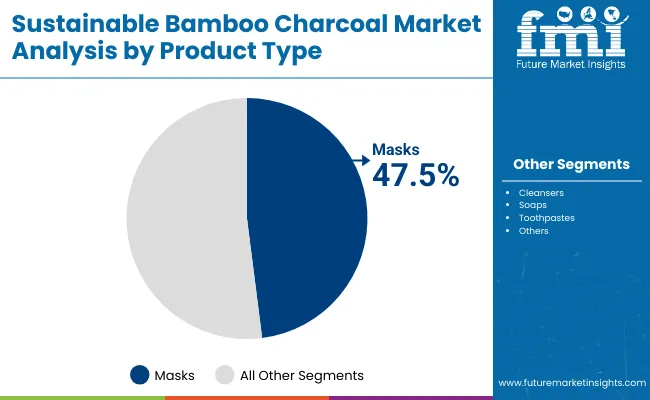
| Segment | Market Value Share, 2025 |
|---|---|
| Masks | 47.5% |
| Others | 52.5% |
The “others” product category held the largest share at 52.5% in 2025, generating USD 695.01 Million. This dominance is projected to continue as a broader range of sustainable bamboo charcoal applications, including cleansers and soaps, gains momentum across mainstream retail and digital platforms. Innovation in daily-use formats is expected to expand penetration, making “others” more accessible and convenient. Masks, accounting for 47.5% share in 2025 (USD 617.2 Million), remain a strong category driven by targeted treatments and premium positioning. However, the broader “others” group is forecast to capture stronger growth potential due to its wider usage occasions and consumer integration into routine care. This category is expected to lead long-term adoption trends, supported by cross-segment innovation and global scalability.
The Sustainable Bamboo Charcoal Market is being reshaped by shifting consumer priorities, tightening sustainability standards, and evolving product innovation cycles, even as complexities in supply chains and rising compliance demands pose challenges to broader adoption and consistent value creation.
Regulatory Convergence Toward Sustainability
Global harmonization of sustainability regulations is expected to act as a powerful catalyst for the bamboo charcoal industry. Mandatory eco-labeling, recyclable packaging directives, and carbon disclosure requirements are reshaping procurement strategies and incentivizing investment into low-impact production systems. These measures are reinforcing consumer trust by guaranteeing verifiable transparency in sourcing and manufacturing practices. With both developed and emerging markets aligning their environmental standards, companies are compelled to innovate responsibly, which is expected to elevate eco-friendly claims beyond marketing narratives into measurable performance advantages. Such regulatory convergence is not only raising entry barriers but is also strengthening competitive differentiation for brands that can credibly demonstrate compliance and proactive leadership in environmental stewardship.
Premiumization through Science-Backed Claims
A clear trend toward premiumization is being observed, where bamboo charcoal products are increasingly validated through dermatological studies, microbiome research, and clinical efficacy trials. This evolution is expected to shift the category away from generic natural positioning toward science-backed credibility that resonates with discerning consumers. Retailers are prioritizing products with substantiated benefits, while e-commerce platforms are amplifying brands that combine sustainability with clinical performance. As ingredient storytelling becomes more sophisticated, bamboo charcoal is being positioned not just as a detoxifying agent but as part of holistic skin-health solutions integrated with hydration and barrier protection. This trend is expected to drive higher margins, reinforce consumer loyalty, and expand acceptance across dermocosmetic and wellness-driven channels, marking a transition from niche adoption to mainstream premium skincare.
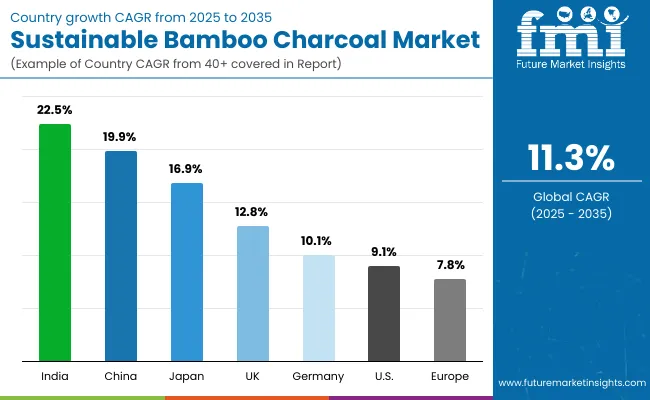
| Countries | CAGR |
|---|---|
| China | 19.9% |
| USA | 9.1% |
| India | 22.5% |
| UK | 12.8% |
| Germany | 10.1% |
| Japan | 16.9% |
The growth outlook of the Sustainable Bamboo Charcoal Market demonstrates clear variation across major economies, shaped by consumer awareness, regulatory priorities, and channel expansion. Asia emerges as the anchor of global momentum, with India recording the fastest CAGR of 22.5% from 2025 to 2035. This trajectory is being fueled by rising disposable incomes, rapid urbanization, and heightened adoption of eco-friendly personal care, enabling both local brands and global entrants to secure traction. China follows closely with a CAGR of 19.9%, where government-led sustainability mandates and increasing urban pollution have been intensifying consumer reliance on detoxifying and eco-claim products. Both countries are expected to reinforce Asia’s position as the global growth hub.
Japan, with an estimated CAGR of 16.9%, is anticipated to strengthen its market presence by leveraging dermocosmetic innovation and premium wellness positioning. In Europe, the UK (12.8%) and Germany (10.1%) are projected to maintain steady expansion, supported by stringent clean-label compliance and sustained consumer demand for natural formulations. North America presents a comparatively mature profile, with the USA projected to grow at 9.1% CAGR, reflecting moderate adoption due to high category penetration. Overall, country-level dynamics underscore Asia’s dominance, with developed markets expected to secure incremental but stable contributions.
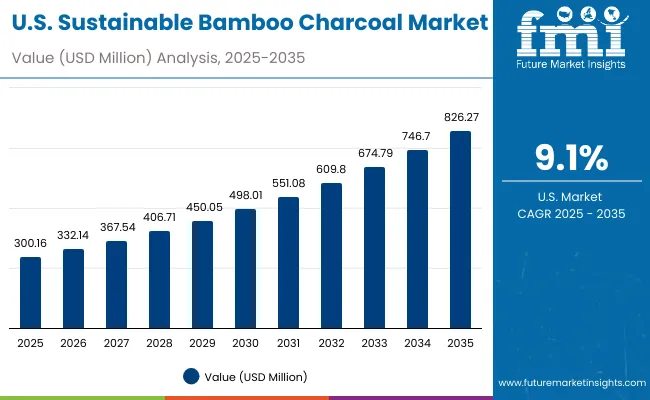
| Year | USA Sustainable Bamboo Charcoal Market (USD Million) |
|---|---|
| 2025 | 300.16 |
| 2026 | 332.14 |
| 2027 | 367.54 |
| 2028 | 406.71 |
| 2029 | 450.05 |
| 2030 | 498.01 |
| 2031 | 551.08 |
| 2032 | 609.80 |
| 2033 | 674.79 |
| 2034 | 746.70 |
| 2035 | 826.27 |
The Sustainable Bamboo Charcoal Market in the United States is projected to grow at a CAGR of 10.4% from 2025 to 2035, advancing from USD 300.16 Million to USD 826.27 Million. Growth is anticipated to be fueled by heightened consumer awareness of eco-friendly claims, strengthened by regulatory pressure on sustainability and packaging compliance. Detoxifying functions are expected to retain prominence, aligning with urban consumer concerns around pollution and oil control. Pharmacies and e-commerce platforms are projected to act as the primary accelerators of adoption, supported by retail strategies emphasizing clean-label and natural formulations. As consumer preference shifts toward verified eco-credentials, premiumization opportunities are anticipated to expand, creating favorable conditions for long-term brand loyalty and differentiation.
The Sustainable Bamboo Charcoal Market in the United Kingdom is projected to grow at a CAGR of 12.8% from 2025 to 2035, supported by rising demand for natural personal care aligned with clean-label compliance. Expansion is expected to be guided by strict sustainability regulations, requiring recyclable packaging and verifiable eco-claims. Specialty retailers and pharmacies are anticipated to lead adoption, with consumer trust enhanced by dermatologist-backed product validation. Online platforms are expected to scale awareness, while eco-conscious consumer groups continue to drive premium purchases. Despite being a mature market, incremental innovation and transparency are expected to sustain growth.
The Sustainable Bamboo Charcoal Market in India is projected to record the highest CAGR at 22.5% from 2025 to 2035, reflecting its role as the fastest-growing global market. Rapid urbanization, rising disposable incomes, and shifting consumer preference toward natural personal care are expected to fuel adoption. Local and global players are anticipated to benefit from growing specialty retail and e-commerce penetration, enabling broader access to eco-friendly and detoxifying products. Supportive government initiatives promoting sustainability are projected to accelerate category expansion, while cost-effective local sourcing is expected to strengthen supply chains.
The Sustainable Bamboo Charcoal Market in China is projected to grow at a CAGR of 19.9% between 2025 and 2035, driven by intensified consumer focus on pollution-related skincare. Strong regulatory emphasis on sustainable sourcing and packaging is expected to accelerate adoption across mass and premium segments. Digital-first platforms such as live commerce are anticipated to become powerful enablers of education and product discovery. Domestic brands are likely to leverage cultural resonance and affordability, while international players are expected to compete through premium positioning and clinical validation.
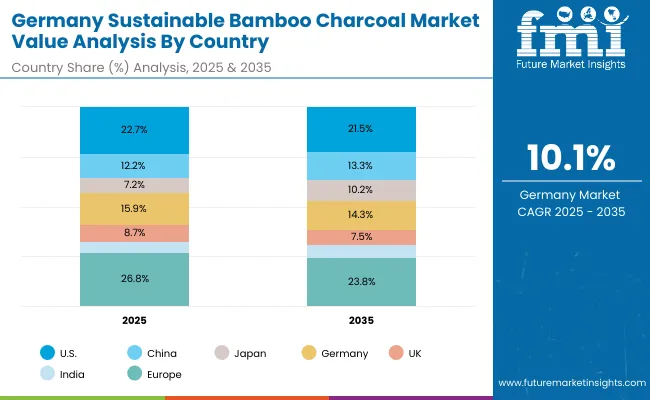
| Countries | 2025% |
|---|---|
| USA | 22.7% |
| China | 12.2% |
| Japan | 7.2% |
| Germany | 15.9% |
| UK | 8.7% |
| India | 5.4% |
| Countries | 2035% |
|---|---|
| USA | 21.5% |
| China | 13.3% |
| Japan | 10.2% |
| Germany | 14.3% |
| UK | 7.5% |
| India | 6.1% |
The Sustainable Bamboo Charcoal Market in Germany is projected to expand at a CAGR of 10.1% from 2025 to 2035, underpinned by strict regulatory standards on product safety and sustainability. Pharmacy-led distribution is expected to anchor adoption, supported by consumer trust in verified eco-labels and dermatologist-tested formulations. Growth is likely to be steady, with eco-friendly and detoxifying claims aligned with European Union directives on clean beauty. Although growth is slower compared with Asia, stability is anticipated to be maintained by strong consumer loyalty and preference for clinically validated products.
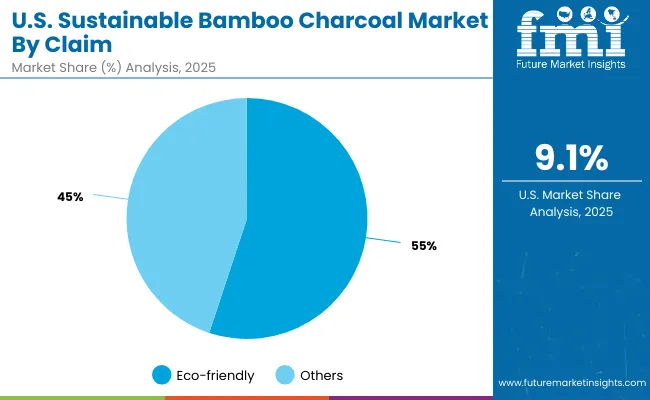
| Segment | Market Value Share, 2025 |
|---|---|
| Eco-friendly | 55.1% |
| Others | 44.9% |
The Sustainable Bamboo Charcoal Market in the United States is projected at USD 300.16 Million in 2025. Eco-friendly claims contribute 55.1%, valued at USD 165.5 Million, while other claims account for 44.9%, valued at USD 134.66 Million. The dominance of eco-friendly positioning highlights the heightened demand for sustainable and natural personal care, reinforced by consumer awareness of environmental impact and regulatory momentum toward recyclable packaging. This leadership reflects a strong alignment between consumer preference and policy direction, ensuring long-term growth for eco-certified products. The “others” category remains significant but is expected to face increasing pressure as clean-label requirements and sustainability scorecards become standard in retail. Strategic advantage is likely to favor brands capable of combining verified eco-claims with clinically validated benefits, reinforcing trust and premium positioning.
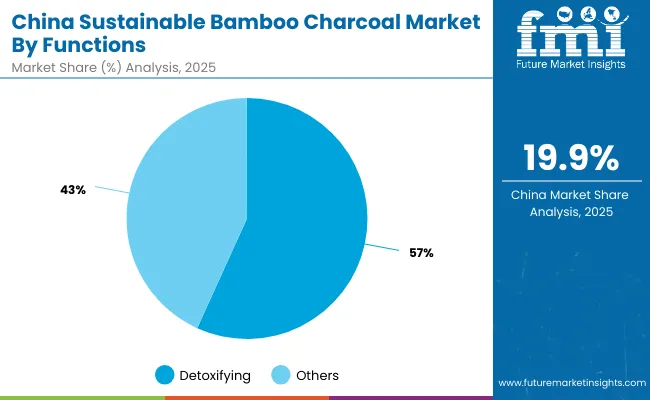
| Segment | Market Value Share, 2025 |
|---|---|
| Detoxifying | 56.8% |
| Others | 43.2% |
The Sustainable Bamboo Charcoal Market in China is projected at USD 162.04 Million in 2025. Detoxifying functions contribute 56.8%, valued at USD 92.1 Million, while other functions account for 43.2%, valued at USD 69.96 Million. The leadership of detoxifying benefits reflects rising consumer concerns about urban air pollution and skin health, positioning bamboo charcoal as a trusted solution in personal care routines. Strengthened awareness of wellness and preventive skincare is expected to drive further adoption of detoxifying formulations, particularly in premium urban markets. The “others” segment remains valuable, yet its share is anticipated to expand more slowly, as multifunctional innovations continue to prioritize detoxification as a central claim. Competitive differentiation is projected to favor products combining detoxifying efficacy with eco-friendly positioning, ensuring both environmental and health-driven appeal in a highly dynamic market.
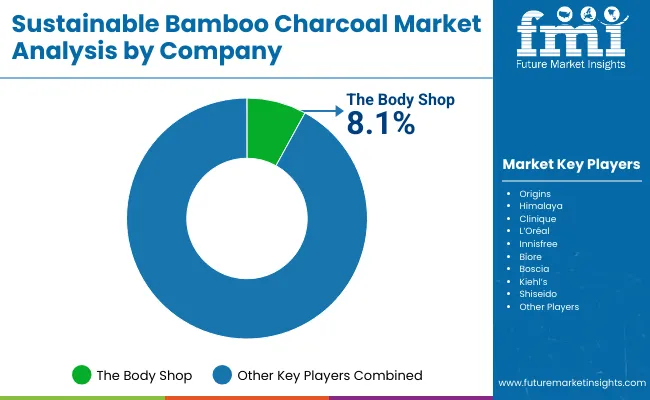
| Company | Global Value Share 2025 |
|---|---|
| The Body Shop | 8.1% |
| Others | 91.9% |
The Sustainable Bamboo Charcoal Market is moderately fragmented, with global leaders, regional specialists, and niche-focused innovators competing across diverse categories. Leading global players such as The Body Shop, L’Oréal, and Shiseido have maintained a strong presence by embedding eco-friendly sourcing, recyclable packaging, and clean-label positioning into their portfolios. Their advantage is expected to be reinforced by investments in sustainability certifications and oMillionichannel distribution strategies that elevate brand trust.
Mid-sized innovators, including Himalaya, Innisfree, and Boscia, are actively scaling through differentiated offerings in vegan and natural formulations. These brands are capitalizing on consumer demand for preventive skincare while expanding reach via e-commerce and specialty beauty channels. Their agility in product innovation and regional adaptability is projected to sustain long-term competitiveness.
Specialty players such as Origins, Clinique, and Kiehl’s are focusing on premium and dermatologically validated products to target consumers seeking science-backed credibility. Their strength lies in leveraging strong parent-company ecosystems, which enable continuous investment in R&D, marketing, and clinical validation.
Competitive differentiation is shifting away from generic natural claims toward measurable sustainability outcomes and clinical validation. Ecosystem-driven strategies combining transparency, digital engagement, and consumer education are expected to define the next phase of competition.
Key Developments in Sustainable Bamboo Charcoal Market
| Item | Value |
|---|---|
| Quantitative Units | USD 1,323.2 million (2025), USD 3,850.7 million (2035) |
| Claim | Eco-friendly, Others |
| Function | Detoxifying, Others |
| Product Type | Masks, Others (Cleansers, Soaps, Toothpastes) |
| Channel | E-commerce, Mass Retail, Pharmacies, Specialty Beauty Stores |
| End-use Industry | Personal Care, Skincare, Oral Care, Cosmetics |
| Regions Covered | North America, Europe, Asia-Pacific, Latin America, Middle East & Africa |
| Countries Covered | United States, China, India, Japan, Germany, United Kingdom |
| Key Companies Profiled | The Body Shop, Origins, Himalaya, Clinique, L’Oréal, Innisfree, Biore, Boscia, Kiehl’s, Shiseido |
| Additional Attributes | Dollar sales by claim, function, and product type; adoption trends in detoxifying and eco-friendly categories; rising demand across e-commerce and pharmacy channels; sustainability-led packaging innovations; regional growth led by India, China, and Japan; competitive advantage shaped by eco-credentials, clinical validation, and oMillionichannel presence |
The global Sustainable Bamboo Charcoal Market is estimated to be valued at USD 1,323.2 million in 2025.
The market size for the Sustainable Bamboo Charcoal Market is projected to reach USD 3,850.7 million by 2035.
The Sustainable Bamboo Charcoal Market is expected to grow at a CAGR of 11.3% between 2025 and 2035.
The key product types in the Sustainable Bamboo Charcoal Market are masks and other personal care formats such as cleansers and soaps.
In terms of function, the detoxifying segment is expected to command 52.5% share in the Sustainable Bamboo Charcoal Market in 2025.






Full Research Suite comprises of:
Market outlook & trends analysis
Interviews & case studies
Strategic recommendations
Vendor profiles & capabilities analysis
5-year forecasts
8 regions and 60+ country-level data splits
Market segment data splits
12 months of continuous data updates
DELIVERED AS:
PDF EXCEL ONLINE
Sustainable Label Market Forecast Outlook 2025 to 2035
Sustainable Footwear Market Forecast and Outlook 2025 to 2035
Sustainable Pharmaceutical Packaging Market Size and Share Forecast Outlook 2025 to 2035
Sustainable Plastic Packaging Market Size and Share Forecast Outlook 2025 to 2035
Sustainable Tourism Market Size and Share Forecast Outlook 2025 to 2035
Sustainable Glycerin Alternatives Market Size and Share Forecast Outlook 2025 to 2035
Sustainable Palm Oil Market Size and Share Forecast Outlook 2025 to 2035
Sustainable Packaging Market Size, Share & Forecast 2025 to 2035
Sustainable Finance Market Trends - Growth & Forecast 2025 to 2035
Sustainable Aviation Fuel Market Growth – Trends & Forecast 2025 to 2035
Market Share Distribution Among Sustainable Packaging Providers
UAE Sustainable Tourism Market Analysis - Growth & Forecast 2025 to 2035
Italy Sustainable Tourism Market Size and Share Forecast Outlook 2025 to 2035
India Sustainable Tourism Market Analysis – Trends & Forecast 2024 to 2034
Mexico Sustainable Tourism Market Trends – Growth & Forecast 2025 to 2035
New Zealand Sustainable Tourism Market Size and Share Forecast Outlook 2025 to 2035
USA Sustainable Tourism Market Trends - Growth & Forecast 2025 to 2035
Trends, Growth, and Opportunity Analysis of Sustainable Tourism in Thailand Size and Share Forecast Outlook 2025 to 2035
Indonesia Sustainable Tourism Market Growth – Forecast 2024-2034
Bamboo Straw Market Size and Share Forecast Outlook 2025 to 2035

Thank you!
You will receive an email from our Business Development Manager. Please be sure to check your SPAM/JUNK folder too.
Chat With
MaRIA